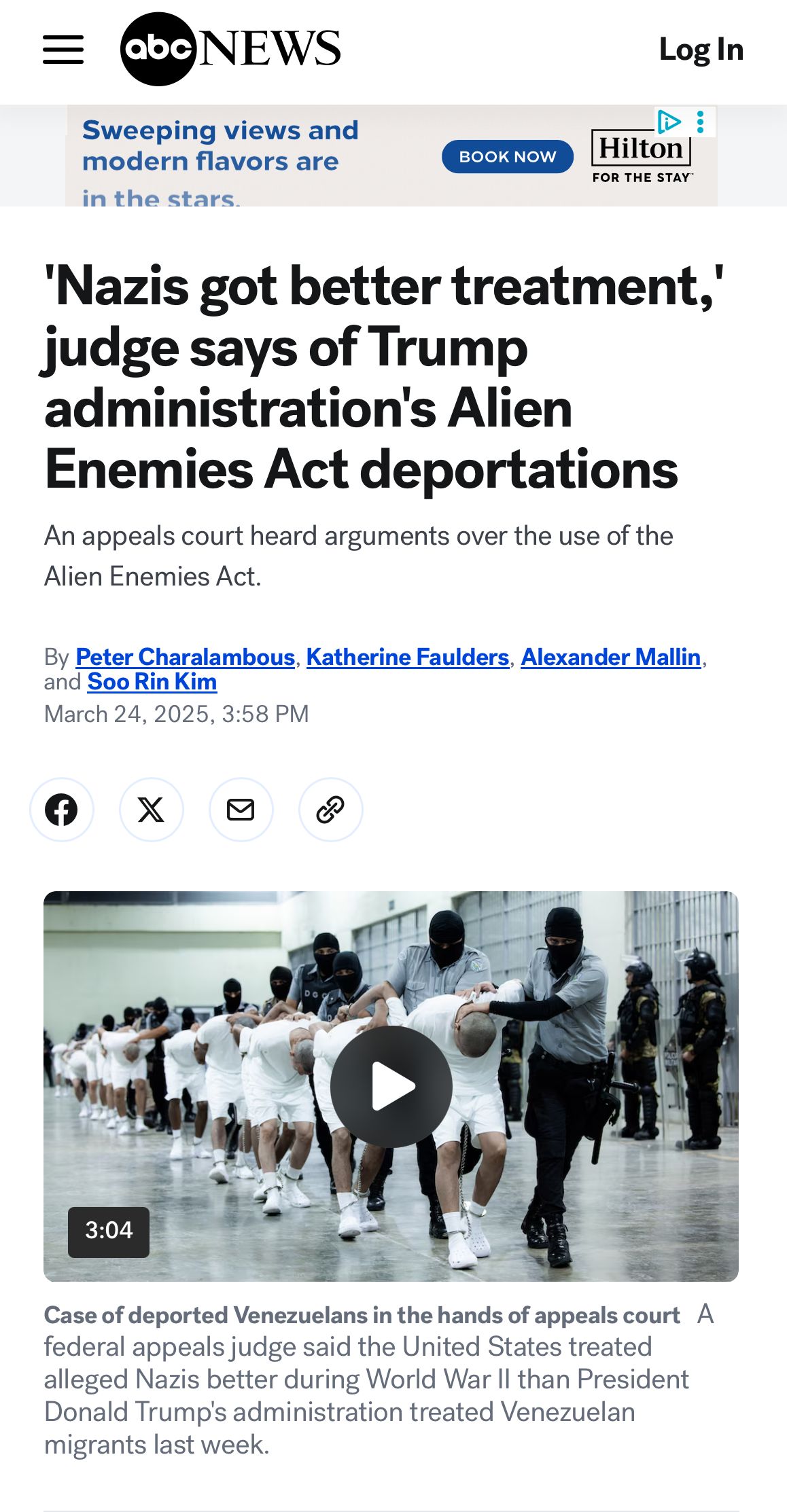ABC News for the win this week. "'Nazis got better treatment,' judge says of Trump administration's Alien Enemies Act deportation." The subhead is "An appeals court is hearing arguments over the use of the Alien Enemies Act ."
ABC communicates a story in a single headline. The first word, Nazis, commands the attention of the reader. ‘Nazis got better treatment’ immediately conveys the gravity of the situation and gives the audience a sense of what the over 250 Venezualans disappeared to El Salvador experienced or are experiencing. It evokes emotion, pathos.

Most importantly, if there are any readers who have not been paying attention, they get several days of actions in one exquisite swoop. We learn there's a judge evaluating the actions, we know the Alien Enemies Act is involved, and by using the "Trump administration" the entire administration is implicated, not just the president. It also avoids the confusion over who signed the Alien Enemies Act since the president says he did not sign it (within days of attempting to persecute the Biden administration's use of the autopen for presidential pardons) and seems to imply that Marco Rubio did.
In fact, it's vital for news organizations to continue to use “Trump administration,” “Trump regime,” “Republican administration” and “the White House.” By using “Trump” alone, media organizations absolve all of the other many actors involved. In this presidency in particular, it's been well-reported that there are a number of people pulling the strings behind Donald Trump and they are all responsible. Going a step further by using “Republican administration” provides the added benefit of conveying that all republicans complicit in White House actions are responsible, particularly if their role is to provide checks and balances and they do not. “The Trump administration" also includes the DOJ lawyers arguing in court.
In general, many headlines regarding judicial actions and decisions tell us what a judge did about a decision without conveying at all what the action means for the people involved: “Judge Overturns Trump Order Blocking Refugee Admissions.” The questions ensue. Refugee admissions to the country? To universities? Which Trump order? What is the original order being overturned? There are so many Trump orders 😱!
NPR's "Judge contends Nazis got more due process than Trump deportees did," isn't what I would call user-friendly. Who walks around their house saying "due process?" (Other than NPR listeners.) It would be one thing if we still accessed news the way we did 15 years ago, but with the amount of sharing on social media and Googling for a news article, the opportunity to reach a plethora of readers is ripe. The question is, to whom are these news organizations talking? If they want to expand their audiences, they need to use language that includes that audience. Language is exclusive. Further, the NPR headline doesn't tell us which deportees. There have been humans sent to Panama, to Costa Rica, to El Salvador, Syria....only the people following the news up close and personal, and those who write about it, teach about it, and adjudicate it, know exactly which group of people most immediately kidnapped this headline refers to.
More than half of Americans read below a 6th grade level, and the average literacy rate of Americans is 7th to 8th grade. Can you imagine your tween saying "contends" as they describe their day at school? (Well maybe your tween does, if you're reading this.)
"Judge Maintains Block on Trump Administration's Deportations Under Wartime Law“ by the New York Times is written for people following this story day-by-day or hour-by-hour -- not the majority of Americans. (The headline has been updated with that story, and now reads “Justice Dept. Refuses to Give Judge Flight Data, Citing State Secrets”).
"Trump's Deportation of Venezuelans Divides Appeals Court” to the average reader, may sound like it’s about the court, not the people involved. Now the source is Bloomberg, which is a very specific audience. However, if we continue to say, "well this is their audience," “they” are going to have a difficult time expanding said audience, and as a consequence, users will continue to look elsewhere for news. News organizations in general have an audience problem that they often shift to the audience by saying it's "news avoidance" or the people are "low-information" voters (citizens). Yes, news avoidance is real, but if we change the way we do the news, citizens may not avoid it so much. “Low-information” as an adjective is problematic and requires a post on its own.
The same goes for the Washington Post: "Appeals judge on Venezuelan deportations: Nazis got better treatment.” Yes, it's a great quote and sentiment, but by frontloading "appeals judge,” they shift the focus to the court and not the significance or impact.
USA Today, which one would argue attempts to be a standard for a broad swath of the American public and their news, says "Judge refuses to lift block on Trump's Venezuelan deportation flights ." "Refuses to lift block” implies that the reader already knows there's a block on an order. Secondly, since the extrajudicial debacle to El Salvador, Venezuela has decided to accept their own citizens who are being deported, so without the photo with the USA Today story, this could be any group of deported people. Furthermore, the flights to El Salvador were not deportations. They were disappearances or kidnappings…extraordinary renditions, if you will. (Interestingly enough, USA Today has changed their search title to Judge keeps block on Trump deportation flights under Alien Enemies Act,”
It’s not just Judge Millet who uses decisive, declarative language. Between Judge Boasberg, Judge Reyes, Judge Alsup, and Judge Howell, the zingers are 🔥. (It’s now professional to write in emojis, correct?) Let’s keep headlines like this coming.

